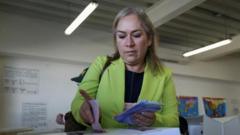Silvia Delgado, a former lawyer for drug lord Joaquín "El Chapo" Guzmán, has been elected as a local criminal judge in Mexico's first judicial elections. While her candidacy faced allegations of connections to organized crime, Delgado maintains she fulfilled her professional duty in defending Guzmán. The election, described by some as lacking public enthusiasm, is touted by supporters as a move toward a more democratic judiciary.
Controversy Surrounds Former El Chapo Lawyer's Election as Judge

Controversy Surrounds Former El Chapo Lawyer's Election as Judge
Silvia Delgado's election as a local judge in Ciudad Juárez raises questions about the integrity of Mexico's judiciary and its ties to organized crime.
Silvia Delgado, a former lawyer for the infamous drug lord Joaquín "El Chapo" Guzmán, has recently been elected as a local criminal judge in Ciudad Juárez following Mexico's inaugural judicial elections. The election results, published on Tuesday, confirm Delgado's victory amidst significant controversy, as transparency advocates alleged that she, along with other candidates, had potential ties to organized crime—a claim that Delgado strongly rejected.
At 51, Delgado served on the legal defense team for Guzmán prior to his extradition to the United States in 2017, where he later received a life sentence for drug trafficking in a supermax prison. In a pre-election interview with the BBC, she argued that Guzmán was entitled to legal representation, downplaying concerns regarding a potential conflict of interest related to her prospective judicial role.
With the voting results announced, Delgado has opted to withhold comments until her victory is officially confirmed. Notably, this election marked a significant shift in Mexico's approach to its judicial system, initiated by the ruling Morena party. Proponents assert that electing judges—including Supreme Court members—directly enhances democratic accountability and responsiveness to public sentiment.
However, opponents worry that this method could compromise the judiciary's independence from political influences. Voter turnout for this election was notably low, recorded at just 13%, which many analysts interpret as a lack of public interest or confidence in the judicial reform. Despite these criticisms, President Claudia Sheinbaum declared the election a success, highlighting a new chapter for Mexico's judicial system.



















